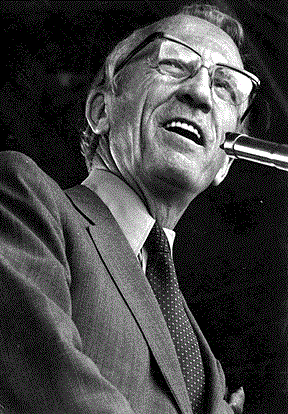One year after Weyburn became a city, a plucky little Scotsman arrived in Canada.
Many years later this man, Thomas Clement Douglas, was to leave an indelible imprint on Weyburn's history.
In the winter of 1929, Tommy Douglas, still a student minister, was asked to come to the Calvary Baptist Church on a trial basis. He was not yet ordained, but the congregation wanted to look him over and see if he was what they were looking for in a minister.
He and his best friend, Stanley Knowles, both came to Weyburn on trial, preaching alternate Sundays. But it was Tommy Douglas the congregation decided upon, and asked him to return after his ordination in 1930.
"They looked us both over and finally decided to call me," writes Douglas in one of his memoirs. "Later, when I became a CCF politician, some of the deacons were thinking that probably they'd made a mistake, and that they should have taken Knowles. But eventually Knowles became a CCF politician too, and they'd have been stuck either way."
Weyburn was hardly "stuck" with Tommy Douglas. Serving the community first for five years as a Baptist minister, he continued on as MP, then MLA through many years as premier of Saskatchewan.

Facing a challenge
As a newly ordained minister, not quite 26 years old, Douglas was to find himself facing the challenge of guiding a congregation through the bleak and troubled times of the 1930s.
He and his new wife, Irma, took up residence in a small apartment on Second Avenue, and Douglas set about his work as minister.
He worked closely with young boys in the community, as well as organizing relief programs and trying to help keep the community together. The Baptist Church soon became the scene of theatrical productions, including an ambitious Christmas pageant and a sunrise Easter service.
Douglas found out about hardship, poverty and courage when he saw the community struggling with the combined drought and depression.
"This period," he writes, "was probably more difficult than any other time to be a minister of a church. The economic depression started about October 1929 . . . I buried a young man at Griffin, and another one at Pangman, both young men in their 30s with young small families who died because there was no doctor readily available, and they hadn't the money to get proper care."
Inspired by his religious beliefs, Douglas worked to help people keep their faith alive in order to face their difficulties. But eventually he came to believe that he could do more for people from a political platform than from a pulpit.
He ran for the Saskatchewan legislature in the election of 1934 and was defeated. While he was deliberating over the next move, he was told by the superintendent of the Baptist Church in Western Canada that he had to choose between politics or the church-he couldn't have both.
That ultimatum did not prevent Douglas from running again in the 1935 federal election, when he became one of the first CCF members to sit in the House of Commons.
For the next nine years, through the rest of the depression and most of the war, Douglas served as Weyburn's M.P. He then went on to take the leadership of the Saskatchewan CCF in 1942.
In 1944 came another milestone. It was June, and Tommy Douglas was spending the day in and around Weyburn. It was a lovely, sunny day, and it was election day. Douglas was waiting for the results to come in.
"If ever a politician had neglected his own constituency, it was I," wrote Douglas in an article prepared shortly before his death. "I had told my people before they nominated me that if I was going to be any use to the party, I'd have to spend 95 percent of my time on the road."
He needed time, he said, to raise some troops. But he wasn't sure if he was going to get the time.
Douglas was shaving when the results came in: he had won over 40 seats out of 52, and led Canada's first Socialist government.
He served as premier for the next 17 years, and then went on to become national leader of the NDP.

In tribute
Tommy Douglas political achievements included his most memorable, North America's first government-run medical care insurance plan; also public automobile insurance, rural electrification, and a host of other innovative social programs.
In his writings, Douglas says he was labeled as "a rather dangerous radical in the community of Weyburn, stirring up the unemployed to ask for more money and sticking my nose into places where it was none of my business." But Tommy Douglas felt it was his business. And whatever the varying politics of the Weyburn people, none can deny the prominent place Douglas has taken in the city's history.
T.C. Douglas will be long remembered as the Baptist preacher from Weyburn, a place where he has said he spent some of the happiest years of his life.
When he died on February 24, 1986, at the age of 81, Douglas was heralded as "a man who did good deeds in a naughty world."
But he was also the little giant of a man who stirred up Weyburn, the province and the nation.



